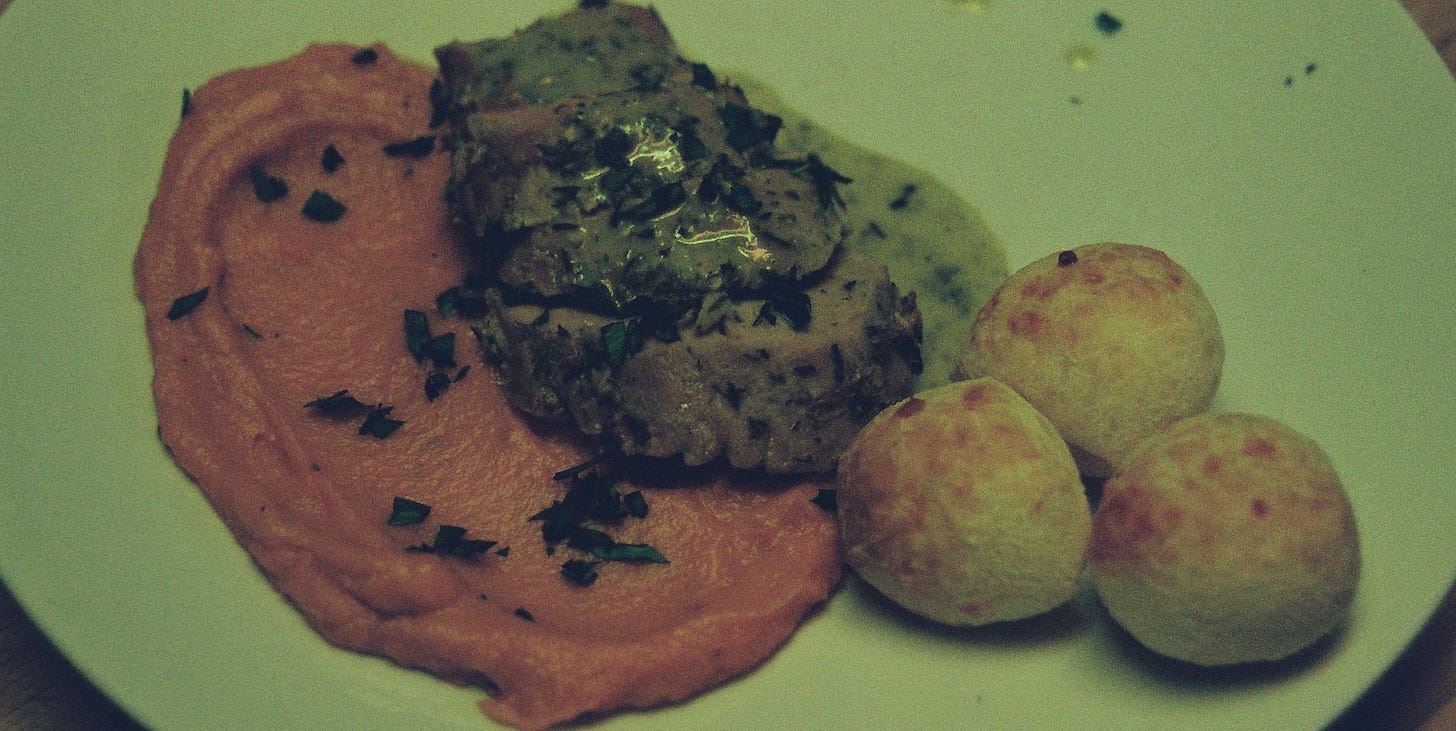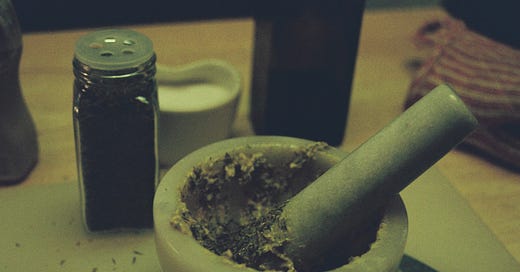Welcome to Tomato House. Here, I explore my love of food, the meals I cook, and how food touches all our lives. I am a home cook, taught by my parents, friends, and many failed meals. I invite you to share my meals and my thoughts, even if you can’t share my table. This is a free publication, but please subscribe to receive the latest essay in your inbox. I’d love to hear your thoughts too, so please leave a comment.
With gratitude.
I crush garlic, ginger, thyme, and Dijon in my mortar and pestle, releasing the pungent oils. Using my mortar and pestle always makes me feel like a witch or an apothecary. A mortar and pestle just doesn’t feel modern, no matter how sleekly designed. It’s the tool that makes me feel most connected to the lineage of cooks across humanity. I can imagine an ancient Roman peasant crushing herbs into a paste to flavor the day’s meal, beginning a lineage of cookery that would extend to a humble Thursday night meal in suburban Dallas.
This particular combination for a marinade I learned from Judith Jones’ The Pleasure of Cooking for One—My hands-down favorite cookbook in my collection. Jones describes how the unexpected use of ginger punches up an otherwise conventional marinade. Judith Jones is an incredible teacher of cookery. Not only did she discover Julia Child, she then went on to have her own cookbook career. This particular book is written with very imprecise recipes. Measurements include a “Knob of Ginger” and a “Fat clove of garlic.” She writes in a voice that is much more similar to a parent teaching a child how to cook than to a professional dictating their expertise. Again, the sense of my place in the great history of cooking washes over me.
I rub the paste on a small pork tenderloin and let it marinate for a bit. Experience has taught me that I can put this in right away or let the meat marinate for hours up to overnight. I have time, so I turn to the sweet potatoes.
I stab the sweet potatoes all over with a paring knife. Stabbing like its a horror movie, creating vents for the steam of the potato to escape. Otherwise, your oven can turn into a sweet potato bomb. My mom taught me that, the night she forgot to do it and we heard a scary “POP” in the oven. Another teacher.
I roast them for an hour-ish? I don’t really know. I started them at lunch, went back to my office, and took them out when their lovely sweetness filled the room. I let them cool and peeled them and combined with lots of butter, a dash of milk, salt, garlic powder, salt, a little ginger powder and a healthy dose of black pepper. My love for sweet potatoes has grown since I’ve been learning more about Southern/Soul Food. More teachers.

While the pork roasts, I start an “Herbed gravy.” This is a random idea I had because I wanted a sauce but knew there wouldn’t be enough pan drippings for au jus. I make a light roux with flour and butter, then pour in a cup or so of chicken broth. Then I add a lot of tarragon. Let it begin to thicken, then with the immersion blender, give it a blitz. The result is a light, green, creamy, herbaceous sauce. I add some salt and a squeeze of lemon to round it out. I think about how Yotam Ottolenghi showed me that nearly any dish can withstand more herbs than one may think. Yet another teacher.
I try to make a nice plate. I’m not good at plating. I can see when a plate looks nice, but I’m terrible at understanding how to create nice plates or even imagine what they should look like. I place the puree down. Then, I line up several slices of pork and drizzle sauce on top, approximating something that I saw on Instagram. More teachers.
I made a beautiful meal, without opening a cookbook, but I had teachers at every step. Wisdom and knowledge of cooking passed down across generations, and geography, all so that I could construct a plate to serve my family. Learning to cook, not just follow recipes, is liberating and also places you in this grand human tradition. I am so grateful to all my teachers: family members, cookbook authors, and inventors of ancient cooking techniques whose names I’ll never know. Because the wisdom they’ve given me has made me more human and more connected to the world.





I feel you, sometimes when cooking I feel transported back through the ages. Something just so visceral about working with meat and vegetables and not cans and plastic bags that makes the process more meaningful. Teachers all over, not always teaching you what to do but sometimes what not to do. Thank you for writing this.